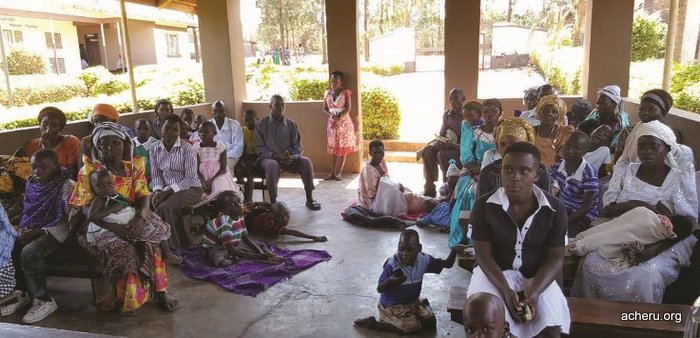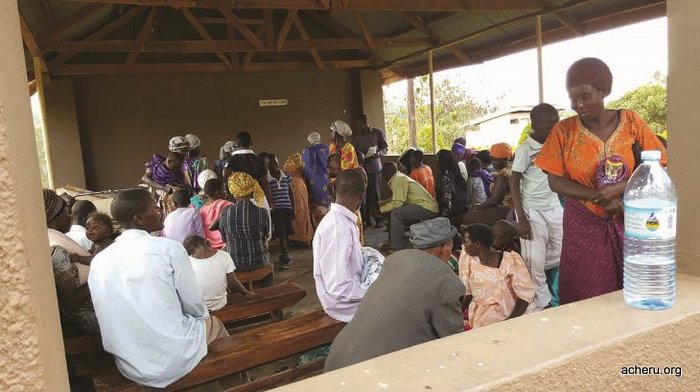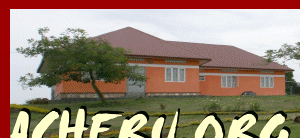| Circular -
December 2016 |
| The work of Acheru centres on the main unit at Kabembe near Mukono, and our Minakulu satellite unit near Gulu in northern Uganda, but work is also undertaken in other areas with rural clinics, or assessments carried out with partner organisations. One such was a recent visit to Rakai district, a relatively isolated and undeveloped area. The name may already be familiar to some as the area where Aids was first encountered on a significant scale in Uganda. Many in Rakai were affected before it spread throughout the country. As usual our focus was on disability, but with a very broad interpretation. Many of the children we see were born with disabilities, but other conditions are the result of injury or neglect, and we try to help any children who can't be properly treated by existing clinics or hospitals. |
Rakai Outreach Report |
| This took place on 22nd to 25th October 2016. It was conducted by two Acheru staff, the social worker and community based rehabilitation worker, in collaboration with Kibaale Community Centre, who we've been in partnership with since they referred their first patient to Cherub in 2007. |
| The aim was to educate and sensitise people about the causes, prevention and treatment of disability, to create awareness about our location and the types of disability managed at Acheru, to identify new patients and follow up on previous patients. |
| The distance from Acheru means regular visits are unrealistic, so the team worked for four days. A total of 34 children were seen, 3 of them former Acheru patients. The work started with education on disability, and the examination of patients to identify conditions which needed immediate intervention, and those which could be rehabilitated at Acheru. |
| There was group discussion about disability and this helped to change the perception of the community. Many think that disability is a result of witchcraft. Others think there are family demons which attack their children. The practice of witchcraft is common in the area. |
| 'Ettalo' is a local word used to describe osteomyelitis. People believe that a neighbour or co-wife who wishes to harm a child puts down herbs where the child may walk, and thus causes a limb to swell and begin oozing pus. We have a lot to do with such families to have them accept the facts. It results in the use of traditional healers, causing prolonged suffering. Cerebral palsy or other conditions are believed to be caused by family demons who must be obeyed and followed. Because of this, nothing may be done to help the child, giving no prospect of any development or the potential of an improved quality of life. |
| With the evidence of previously treated patients from the area, pictures shown, and explanations of treatment, the eyes of many people were opened. We believe many accepted what they were told and are now willing to bring their children for treatment. Above all, they are taught to turn back to almighty God because He is more powerful than the demons they believe in. |
Successful outcomes: |
| New patients assessed who can be treated and rehabilitated at Acheru. |
| Through counselling and education, many people's attitude to and perception of disability was transformed. |
| Working with the community brought people together; the visits made families and community members feel that they are loved and cared for. |
| The team could identify patients who had been denied treatment, and were able to motivate and encourage. |
| People now know there is a place where they can take their children for treatment. |
Challenges faced: |
| Time management was very poor, resulting in the team having to work very late. |
| Because of long distances, many children who are treated fail to come back for reviews or further treatment. |
Way Forward: |
| There is a need for increased sensitisation and follow up. |
| More work needed to help change perception of disability, and to identify problem areas. |
Plan: |
| Tremendous work was done in 4 days but a huge need was identified. Many children are out there with no information available on facilities for treatment or rehabilitation, and people have no idea of what conditions could respond to treatment. |
| Previously treated patients were in serious need of follow up. |
| The plan is to make more distant follow ups and outreaches to strengthen awareness and sensitisation, and to check on progress of children who have been treated before. |
| This outreach has helped make many people aware of what we do, and the outcome for previously treated children has been improved. |
Reported by: Harriet Nakabuye - CBR and Rose Nakabugo - Social Worker. |
| Reports like the above raise concerns about the difficulty of a small unit like Acheru covering such a large area. It's not the way we might wish to plan the work, but we must recognise that many Acheru patients have already come from very far afield. Good relations with other organisations and community groups can result in an impact and influence much greater than could be achieved by the Acheru staff working alone, and I want to recognise the efforts of Acheru staff in developing the community work. The effectiveness of Acheru's work can be seen in all the children successfully treated, but work in the community can not only locate children for treatment, but through education and changed attitudes can help prevent many problems and ensure earlier intervention. |
Brian Dorman |
 |
 |





